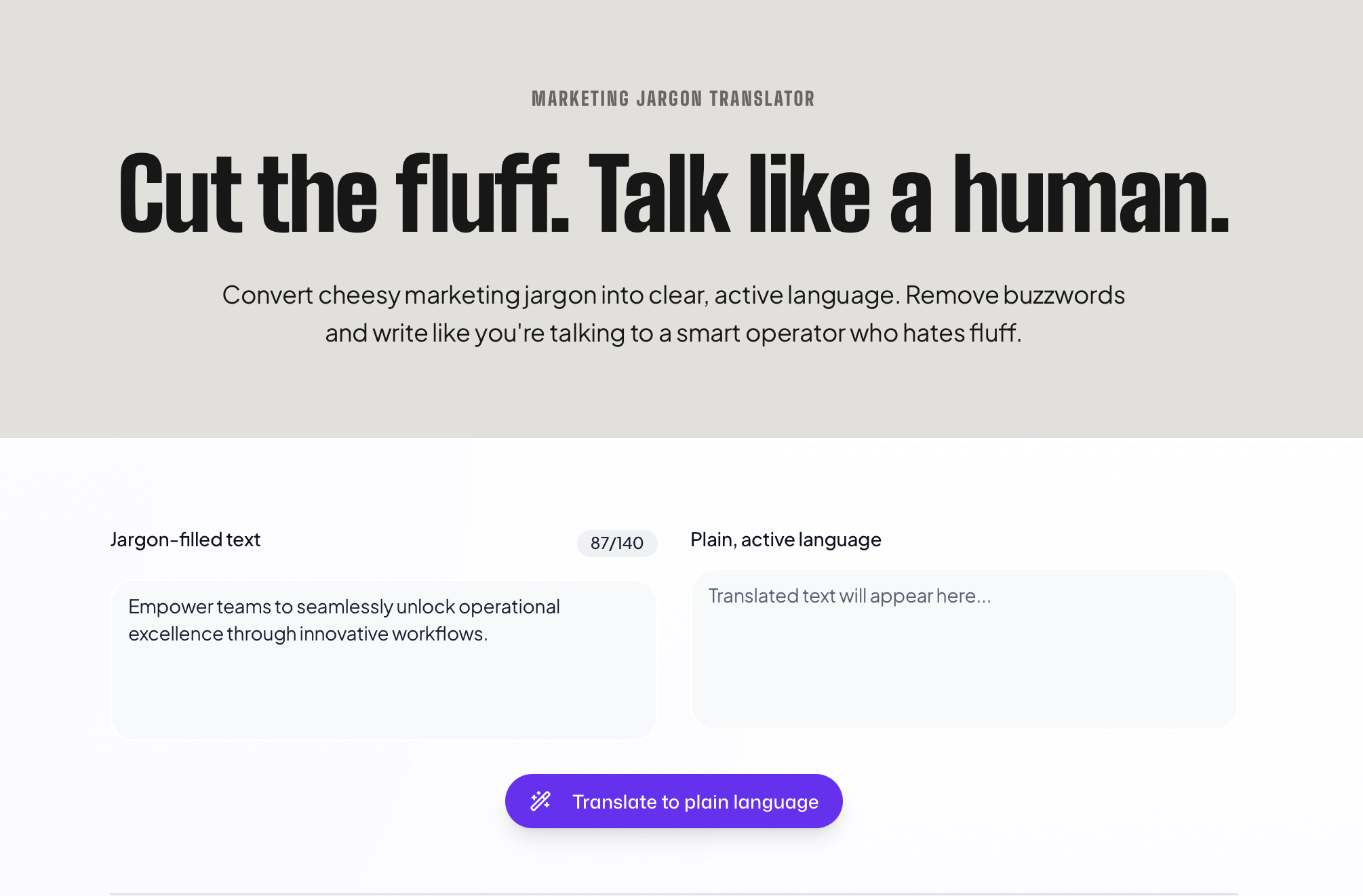We Built a Jargon Translator (Because Marketing Speak Is Out of Control)

Paste your jargon-heavy marketing copy, get actual English back. It's silly, it's fun, and it might save your messaging from corporate word salad.
I received an email last week with the subject line: "Leverage Our Best-in-Class Solution to Synergize Cross-Functional Stakeholders and Drive Transformational Value."
I read it three times and still had no idea what the company actually did.
Turns out they make project management software. They could have just said that.
This happens so often in B2B marketing that we've become numb to it. We've all written it. We've all received it. We've all sat in meetings where someone turned "we help teams collaborate" into "we empower stakeholders to leverage synergies across the digital transformation journey."
So we built something ridiculous: a Marketing Jargon Translator.
What It Does (In Plain English)
The tool is absurdly simple. You paste jargon-heavy marketing copy into a box. It translates it into actual English.
That's it. No login. No trial. No "book a demo to unlock the full experience."
You paste corporate word salad. You get real sentences back.

Example: "Our innovative platform empowers organizations to leverage cutting-edge technologies and drive digital transformation initiatives that deliver best-in-class outcomes" becomes "Our software helps companies use new tools to improve their business."
See? Same meaning. 90% fewer words that make you want to close the tab.
Why This Exists (And Why We Know It's Silly)
Let's be honest: this is a marketing activation. We're not solving world hunger here. We built a fun tool that does one specific thing—strips the frosting off marketing copy so you can see what's actually being said.
But here's the thing: we kept finding ourselves pasting competitor messaging into ChatGPT asking "what are they actually saying?" So we made a tool that does it automatically.
And yes, there's some irony in a messaging platform building a jargon translator. But that's kind of the point. The best way to avoid creating jargon is to see what it looks like when you strip it away.
The Jargon Hall of Shame (With Translations)
We tested the translator on real B2B marketing copy we found in the wild. Here are some favorites:
"Transform your digital journey"
Translation: "Improve your digital process."
"Empower stakeholders to drive value"
Translation: "Help stakeholders create value."
"Leverage synergies across the ecosystem"
Translation: "Help people work together."
"Best-in-class solution"
Translation: "Provides the best solution." (or sometimes just "product")
"Unlock transformational outcomes"
Translation: "Create big improvements."
"Seamlessly integrate cross-functional workflows"
Translation: "Help different teams work together easily."
"Optimize your value realization journey"
Translation: "Improve your process for getting value from your work."
The pattern is clear: we use twelve words when two would do. We add "transformational" and "cutting-edge" and "empower" to make things sound important. We replace concrete nouns with abstract ones.
And somehow we've convinced ourselves this sounds professional.
Why Smart People Write This Stuff
Nobody wakes up wanting to write terrible marketing copy. Jargon happens because:
We're trying to sound credible. "Improve your website" feels too simple for a $50K annual contract. So we dress it up in "digital transformation" language to justify the price.
We're afraid of being too specific. If we say exactly what we do, we might exclude someone. So we stay vague and use terms like "innovative platform" that could mean anything.
Everyone else is doing it. When every competitor talks about "empowering stakeholders," you feel pressure to use the same language or risk sounding unsophisticated.
We've forgotten what normal people sound like. After reading enough B2B marketing, "leverage synergies" starts to seem like an acceptable phrase. It's not.
The jargon isn't malicious. It's just what happens when good intentions meet corporate approval processes.
What This Has to Do With Segment8
Quick context: Segment8 builds platforms that help PMMs manage messaging, positioning, and go-to-market execution. The idea is that if your messaging is clear from the start, you don't end up with seventeen different versions of "what we do" floating around—some in plain English, some in corporate jargon, some in whatever the sales team made up last Tuesday.
The Jargon Translator isn't a core platform feature. It's not going to show up in your QBR dashboard. But it does illustrate a point: most jargon problems are upstream problems.
If your messaging framework clearly articulates what you do, for whom, and why it matters, your team doesn't resort to jargon when they're writing website copy at 11pm before a launch.
But if your messaging is vague—or if everyone on the team has a slightly different interpretation—people fill the gaps with corporate buzzwords that sound safe.
Clear messaging upstream prevents jargon downstream. The translator just shows you what happens when you skip that step.
Try It (It's More Fun Than It Should Be)
Look, this is a silly tool. We know that. But it's also oddly satisfying to paste in some truly terrible marketing copy and watch it get stripped down to what it actually means.
We've been using it internally on our own drafts. Turns out we're not immune to jargon either. The translator has a way of humbling you.
To try it: Head to segment8.com/tools/jargon-translator
Paste in some marketing copy—your own, your competitor's, that email you got this morning that made no sense. See what it actually says.
If nothing else, you'll get a few examples of what not to write.
And if you find yourself using it on your own copy repeatedly, that might be a sign you need better messaging frameworks. We can help with that too. But first, have some fun with the translator.
After all, if we can't laugh at our own industry's worst habits, what are we even doing here?

Kris Carter
Founder, Segment8
Founder & CEO at Segment8. Former PMM leader at Procore (pre/post-IPO) and Featurespace. Spent 15+ years helping SaaS and fintech companies punch above their weight through sharp positioning and GTM strategy.
More from Messaging & Positioning
StoryHQ
Create beautiful marketing documents in minutes. Professional ebooks, case studies, and product briefs without design skills.
Learn moreReady to level up your GTM strategy?
See how Segment8 helps GTM teams build better go-to-market strategies, launch faster, and drive measurable impact.
Book a Demo